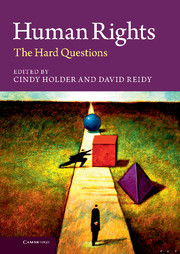Book contents
- Frontmatter
- Contents
- Figure
- List of table
- Notes on contributors
- Introduction
- Part I What are human rights?
- Part II How do human rights relate to group rights and culture?
- Part III What do human rights require of the global economy?
- Part IV How do human rights relate to environmental policy?
- 11 Human rights in a hostile climate
- 12 A human rights approach to energy, poverty and gender inequality
- 13 Pollution wolves in scientific sheep’s clothing
- Part V Is there a human right to democracy?
- Part VI What are the limits of rights enforcement?
- Part VII Are human rights progressive?
- Index
- References
11 - Human rights in a hostile climate
Published online by Cambridge University Press: 05 May 2013
- Frontmatter
- Contents
- Figure
- List of table
- Notes on contributors
- Introduction
- Part I What are human rights?
- Part II How do human rights relate to group rights and culture?
- Part III What do human rights require of the global economy?
- Part IV How do human rights relate to environmental policy?
- 11 Human rights in a hostile climate
- 12 A human rights approach to energy, poverty and gender inequality
- 13 Pollution wolves in scientific sheep’s clothing
- Part V Is there a human right to democracy?
- Part VI What are the limits of rights enforcement?
- Part VII Are human rights progressive?
- Index
- References
Summary
According to mainstream science, humanity faces a time of emerging global environmental crises. Massive increases in economic output and human population over the last two centuries or so are putting increasing pressure on natural systems, including those basic to the support of human and other forms of life, such as climate, fresh water, oceans and natural habitat. In this context, hard questions arise about how a human rights approach can help us to understand and act on these concerns.
This chapter investigates such questions through the example of global climate change. It makes three central claims. First, climate change and similar problems pose a profound ethical challenge to existing institutions and theories. Second, a human rights approach can play a role in addressing this challenge through its articulation, development and defense of a basic but often neglected ethical intuition. Nevertheless, third, there remains much to be done. In particular, early work tends to overplay the initial advantages of human rights as such, and underestimate the role played by specific conceptions of human rights that are much more controversial and ambitious. Moreover, current human rights paradigms are not directed to the central characteristics of the profound challenge. Given all this, a practical and theoretical reorientation is needed. This has implications for the evolving project of political philosophy on a global, intergenerational and ecological scale.
- Type
- Chapter
- Information
- Human RightsThe Hard Questions, pp. 211 - 230Publisher: Cambridge University PressPrint publication year: 2013
References
- 6
- Cited by

